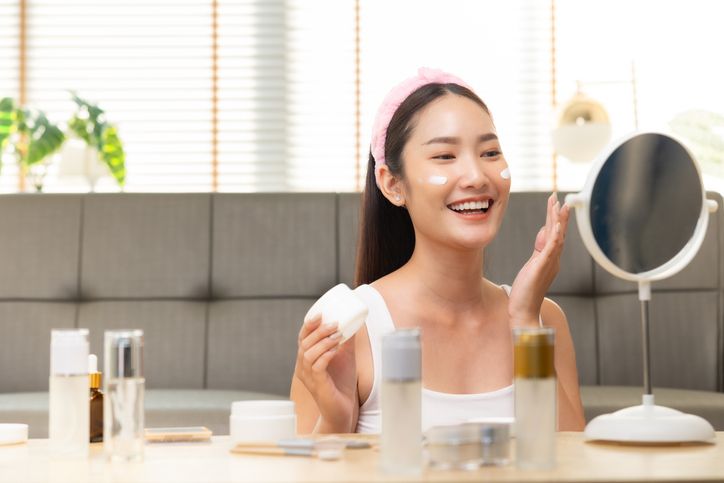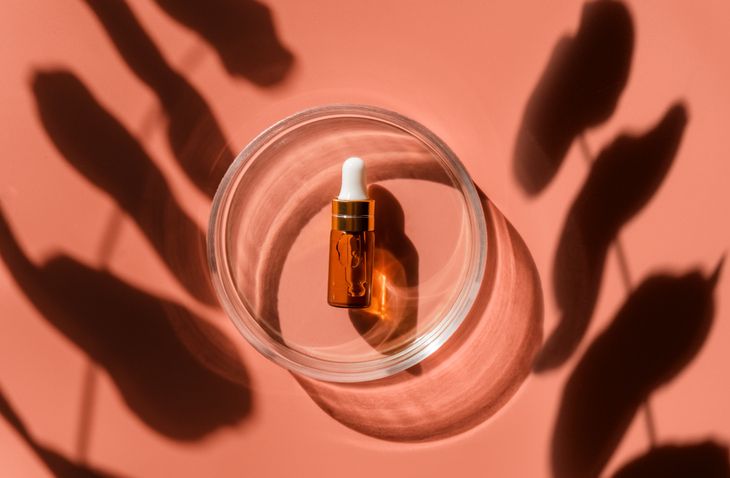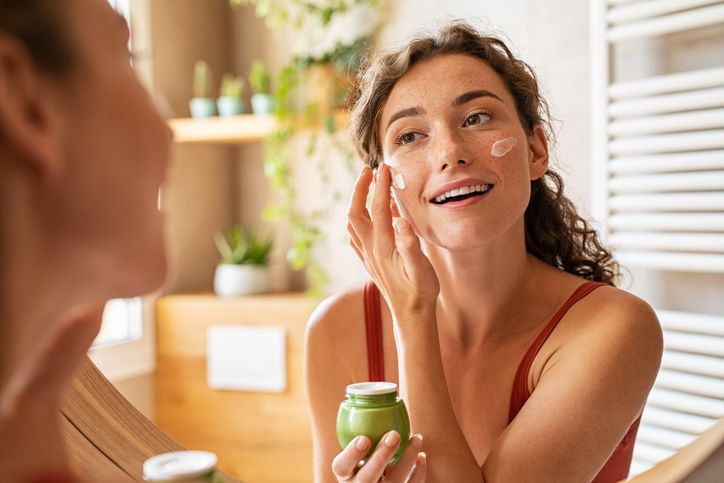
- Home
- Trend
- Weight Loss Strategies
- Acne Tips
- Hair Health Information
- Blemish Removal Tips
- Acne Scar Removal Tips
- Muscle Building Techniques
- Intimate Care Tips
- Postpartum Intimate Care
- Eye Bags Wiki
- Tips for Face Slimming
- Secret of Permanent Hair Removal
- Breast Enlargement Tips
- Cure to Snoring
- Marionette Lines
- Skin-Tightening Secrets
Dark spots can be frustrating, leaving your skin tone uneven and your confidence a little shaken. But fear not! This guide equips you with the knowledge and tools to fight back and achieve a radiant, even-toned complexion.
Dark Spots and Their Causes

Dark spots, scientifically termed hyperpigmentation, arise from an overproduction of melanin, the pigment responsible for skin coloration. This excess melanin can lead to patches of skin appearing darker than the surrounding areas. Several factors contribute to the development of dark spots, including:
Sun Exposure
Prolonged exposure to ultraviolet (UV) rays from the sun triggers melanocytes, the pigment-producing cells in the skin, to produce more melanin. This response can result in sunspots or freckles, especially in areas regularly exposed to sunlight.
Acne Scars
Post-inflammatory hyperpigmentation occurs when acne lesions heal and leave behind dark marks or spots. This type of hyperpigmentation is common in individuals with acne-prone skin and can persist long after the blemish has resolved.
Hormonal Changes
Fluctuations in hormone levels, such as during pregnancy (melasma or "pregnancy mask") or due to hormonal disorders, can stimulate melanin production, leading to the formation of dark patches on the skin.
The Powerhouse Ingredients for Fading Dark Spots

Vitamin C
Action: Vitamin C is a potent antioxidant that works to brighten the skin by inhibiting melanin production. It also helps to reduce the appearance of existing dark spots and prevents the formation of future ones by neutralising free radicals caused by UV exposure and environmental aggressors.
Kojic Acid
Action: Kojic acid is a natural ingredient derived from mushrooms or fermented rice. It works by inhibiting tyrosinase, an enzyme involved in melanin production. By slowing down melanin synthesis, kojic acid fades existing dark spots and helps to even out skin tone.
Licorice Root Extract
Action: Licorice root extract contains compounds like glabridin that have skin-brightening properties. It works to soothe the skin and reduce hyperpigmentation, making it an effective ingredient for addressing dark spots, including those on darker skin tones.
Azelaic Acid
Action: Azelaic acid is a multi-tasking ingredient that targets various skin concerns, including hyperpigmentation, acne, and redness. It works by inhibiting melanin production, reducing inflammation, and preventing the formation of new dark spots, making it beneficial for those with acne-prone skin.
Tranexamic Acid
Action: Tranexamic acid is an innovative ingredient that helps fade existing dark spots and prevents new ones from forming. It works by inhibiting the transfer of melanin from melanocytes to surrounding skin cells, effectively reducing hyperpigmentation and promoting a more even skin tone.
免費體驗
PicoCure Pigmentation Removal Treatment
1 Minute Self-Registration
Date should not be before minimal date
Choosing the Right Dark Spot Corrector
Choosing the most effective dark spot corrector hinges on factors such as your skin type and the extent of your hyperpigmentation. Let's delve into these considerations:
Sensitive Skin
Recommendation: For sensitive skin types, prioritise gentle formulations containing ingredients like licorice extract or hyaluronic acid. These ingredients not only brighten the skin but also do so without causing irritation, ensuring a soothing and effective approach to addressing dark spots.
Acne-Prone Skin
Recommendation: If you have acne-prone skin, opt for correctors that incorporate salicylic acid. This beta hydroxy acid not only helps combat acne by unclogging pores and reducing inflammation but also works to fade dark spots simultaneously, providing a comprehensive solution for clearer and more even-toned skin.
Stubborn Spots
Recommendation: For stubborn or deeply pigmented spots, consider targeted spot treatments containing potent ingredients like kojic acid or a higher concentration of vitamin C. Kojic acid inhibits melanin production, aiding in the gradual lightening of dark spots, while vitamin C boosts collagen production and brightens the skin, effectively addressing more persistent areas of hyperpigmentation.
Choosing the Right Colour to Brighten Skin Up
The colour of a dark spot corrector can vary depending on the formulation and intended use. Here's a general guide on choosing the right colour of dark spot corrector for different skin conditions:
1. Fair to Light Skin Tones
For fair to light skin tones, opt for a dark spot corrector that is lighter in shade, such as a peach or light beige tone. These colours help to neutralise redness and brighten the skin without leaving a noticeable cast.
2. Medium to Olive Skin Tones
For medium to olive skin tones, a corrector with a slightly deeper shade, such as a soft orange or apricot hue, can work effectively. These colours help to counteract darker pigmentation and provide a more even skin tone.
3. Deep to Dark Skin Tones
Deep to dark skin tones may benefit from using a corrector with a richer colour, such as a warm caramel or deep peach shade. These colours are designed to blend seamlessly with darker skin tones and address hyperpigmentation without appearing too light or ashy.
It's important to note that while colour correction can help neutralise different types of discoloration, such as redness or dark spots, choosing the right shade of corrector also depends on individual skin concerns and preferences. Conducting a patch test or consulting with a makeup specialist can help determine the most suitable colour corrector for your specific skin condition and tone.
How Do You Know If You Should Use a Corrector in Fighting Dark Spots?
While dark spot correctors can be effective in reducing the appearance of dark spots and hyperpigmentation, it's important to note that they may not completely remove all dark spots, especially those that are deeply pigmented or caused by underlying skin conditions.
The effectiveness of a dark spot corrector depends on various factors, including the type and severity of the dark spots, the ingredients and formulation of the corrector, and how consistently and correctly it is used. Here are some key points to consider:
1. Types of Dark Spots
Dark spots can vary in their causes and characteristics. Some dark spots, such as sunspots or post-inflammatory hyperpigmentation from acne scars, may respond well to topical treatments like dark spot correctors. However, other types of pigmentation, such as melasma or deeper dermal hyperpigmentation, may be more challenging to treat and may require professional interventions.
2. Consistency and Patience
Achieving noticeable results with a dark spot corrector requires consistent and patient use over time. It's important to follow the product instructions and apply the corrector regularly as part of a skincare routine. Results may vary from person to person, and improvement in dark spots may take several weeks or months.
3. Professional Treatments
For stubborn or resistant dark spots, dermatological procedures like chemical peels, laser treatments, or microneedling may be recommended. These procedures can target pigmentation at a deeper level and may provide more significant results compared to topical products alone.
4. Sun Protection
Sun exposure can exacerbate dark spots and hinder the effectiveness of dark spot correctors. Using a broad-spectrum sunscreen with a high SPF daily is crucial to protect the skin from UV rays and prevent further darkening of existing spots.
5. Skincare Routine
Incorporating other skincare products with ingredients like antioxidants, exfoliants, and moisturisers can complement the effects of a dark spot corrector and support overall skin health.
While dark spot correctors can fade and lighten dark spots, complete removal of all dark spots may not always be achievable. It's essential to set realistic expectations and consult with a dermatologist for personalised recommendations and treatments tailored to your specific skin concerns.
How to Maximise The Effectiveness of Dark Spot Corrector?
When using a dark spot corrector, it's essential to complement it with a well-rounded skincare routine to maximise results and maintain overall skin health. Here are some key components that are beneficial to incorporate alongside a dark spot corrector:
1. Cleanser: Start with a gentle cleanser suited to your skin type to remove dirt, oil, and impurities without stripping the skin of its natural moisture. A clean canvas allows the corrector to penetrate effectively.
2. Sunscreen: Apply a broad-spectrum sunscreen with a high SPF daily, especially when using a dark spot corrector. Sun protection helps prevent further darkening of existing spots and protects against UV-induced melanin production, which can exacerbate hyperpigmentation.
3. Moisturiser: Follow up with a hydrating moisturiser to keep the skin nourished and balanced. Look for moisturisers with ingredients like hyaluronic acid or ceramides to lock in moisture and support skin barrier function.
4. Antioxidants: Incorporate antioxidants into your routine, such as vitamin C or niacinamide, to boost skin health, brighten the complexion, and protect against free radical damage that can contribute to pigmentation issues.
5. Exfoliation: Use gentle exfoliants, such as alpha hydroxy acids (AHAs) or beta hydroxy acids (BHAs), a few times a week to promote cell turnover and reveal fresher, more even-toned skin. Avoid over-exfoliating, which can irritate the skin and worsen pigmentation.
6. Serums and Treatments: Depending on your specific skin concerns, consider adding serums or treatments with additional active ingredients, such as retinoids for anti-aging benefits or botanical extracts known for brightening and clarifying the skin.
7. Healthy Lifestyle: Maintain a healthy lifestyle by staying hydrated, eating a balanced diet rich in antioxidants and nutrients, getting adequate sleep, and managing stress levels. These factors can contribute to overall skin radiance and support the effectiveness of your dark spot corrector.

Perfect Medical: Delivering Results for a Radiant You
In order to prevent future dark spots, it is important to take precautions instead of just using dark spot correctors to tackle the current problem. Perfect Medical's PicoCure Pigmentation Removal TreatmentPicoway Picosecond Laser Treatment emerges as a powerful ally in the fight against dark spots, working seamlessly alongside topical correctors. Here's why:
• Unmatched Precision: Unlike broad-spectrum topicals, PicoCurePicoway delivers ultra-short laser pulses that precisely target the pigmented cells causing dark spots. This pinpoint accuracy complements correctors by addressing specific areas with laser focus.
• Reaching New Depths: Penetrating deeper than topical solutions, PicoCurePicoway's laser energy disrupts pigment cells even in the skin's lower layers, where stubborn dark spots often reside. This deeper reach proves particularly effective for persistent pigmentation issues.
• Time is of the Essence: PicoCurePicoway's picosecond technology works swiftly, delivering rapid pulses for efficient treatment. This speed makes it ideal for busy individuals seeking a streamlined approach to tackling dark spots.
• Beyond Pigmentation: While addressing dark spots remains a key focus, PicoCurePicoway's laser treatment offers an additional benefit. By stimulating collagen production, it improves skin texture, firmness, and overall appearance, providing a holistic approach to rejuvenation.
• A Tailored Solution: Customization is key. PicoCurePicoway allows dermatologists to fine-tune treatment settings based on individual skin concerns and unique pigmentation patterns. This personalised approach ensures the treatment directly addresses each patient's specific needs for maximum effectiveness.
• Minimal Disruption: Recovery is quick with PicoCurePicoway. Most individuals can return to their daily routines shortly after the procedure, making it a convenient option for those seeking effective dark spot correction without extended downtime.
• Expertise Matters: PicoCurePicoway treatments are performed by qualified dermatologists or medical professionals, guaranteeing safe and effective care under expert supervision. This level of experience optimises the treatment process and outcomes for individuals seeking to elevate their dark spot corrector routine with advanced laser technology.
By combining the targeted action of topical correctors with the precision and depth of PicoCure Pigmentation Removal TreatmentPicoway Picosecond Laser Treatment, you can achieve a comprehensive and customised approach to addressing hyperpigmentation and achieve a clearer, more radiant complexion. Keen to know more? Reach out to us for a trial treatment session today!
<<<register form link>>>免費體驗
PicoCure Pigmentation Removal Treatment
1 Minute Self-Registration
Date should not be before minimal date
FAQ

1. How does a targeted dark spot corrector differ from regular skincare products?
A targeted dark spot corrector is specifically formulated to address hyperpigmentation and dark spots, using potent ingredients like vitamin C to effectively lighten and even out skin tone. Unlike regular skincare products that may have a broader focus on hydration or general skin health, targeted correctors prioritise treating specific pigment irregularities, making them more concentrated and effective in reducing discoloration.
2. Can a vitamin C serum help lessen hyperpigmentation on the skin's surface?
Yes, vitamin C serums are known for their antioxidant properties and ability to reduce sun damage, leading to a healthier glow and improved skin texture over time. Vitamin C's antioxidant properties help combat free radicals that contribute to hyperpigmentation, while its brightening effects can help fade dark spots and promote a more even skin tone, particularly on the skin's surface.
3. Is it normal for a targeted dark spot corrector to irritate the skin?
While some targeted dark spot correctors may cause mild irritation initially, it's essential to choose products formulated for sensitive skin and to patch test before full application to minimise the risk of irritation. Irritation can occur due to active ingredients like hydroxy acids or retinoids, which may cause tingling or redness, especially if the skin is sensitive or compromised. Opting for gentler formulations and gradually introducing the product into your skincare routine can help mitigate potential irritation.
4. Can a vitamin C dark spot corrector deliver visible results in just two weeks?
While individual results may vary, consistent use of a high-quality vitamin C dark spot corrector can lead to noticeable improvements in hyperpigmentation and sun damage within a short time frame. Vitamin C is known for its ability to brighten the skin and reduce melanin production, which can help fade dark spots and enhance overall skin radiance. However, it's important to continue using the product as directed for optimal results and to maintain the improvements over time.
5. How can antioxidant properties in a targeted dark spot corrector benefit the skin's texture and overall health?
Antioxidant-rich dark spot correctors, such as those containing vitamin C, help protect the skin from environmental damage, reduce inflammation, and promote collagen production, resulting in smoother skin texture and a healthy glow. Antioxidants neutralise free radicals generated by UV exposure and pollution, which can lead to premature ageing and skin damage. By strengthening the skin's barrier and supporting collagen synthesis, antioxidant properties contribute to improved skin texture, firmness, and overall skin health.








